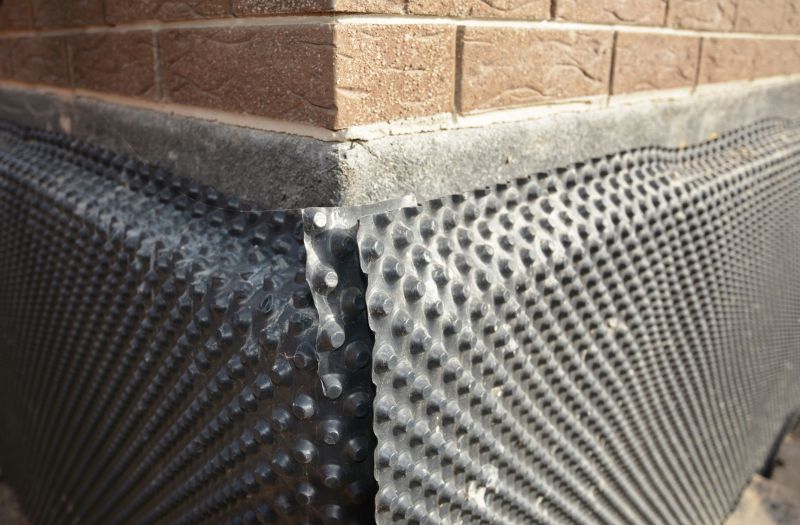Top Waterproofing Products To Protect Your Home and Property
Explore the leading waterproofing solutions designed to prevent leaks, moisture damage, and ensure long-lasting protection.
 Waterproofing products are essential solutions used to prevent water infiltration and protect structures from moisture damage. These products are applicable in various contexts, including foundations, roofs, basements, and interior spaces that require moisture barrier protection. Selecting the right waterproofing material depends on factors such as surface type, exposure conditions, and specific project requirements. Proper application of these products can help maintain structural integrity and prevent issues like mold, mildew, and water leaks.
Waterproofing products are essential solutions used to prevent water infiltration and protect structures from moisture damage. These products are applicable in various contexts, including foundations, roofs, basements, and interior spaces that require moisture barrier protection. Selecting the right waterproofing material depends on factors such as surface type, exposure conditions, and specific project requirements. Proper application of these products can help maintain structural integrity and prevent issues like mold, mildew, and water leaks.
Top Overall Option
Versatile Waterproofing Membrane
A high-quality, flexible membrane designed for a wide range of applications, offering seamless protection against water intrusion. Its ease of installation and durable composition make it suitable for foundations, roofs, and basements, providing a reliable moisture barrier over time.
Types of Products For Waterproofings
Liquid Rubber Coatings
Flexible liquid coatings that form seamless waterproof barriers, ideal for roofs and decks.
Bituminous Membranes
Self-adhesive or torch-applied sheets used for foundation and roof waterproofing.
Polyurethane Sealants
High-performance sealants suitable for cracks and joints in various surfaces.
Cementitious Waterproof Coatings
Waterproof coatings that can be applied directly to concrete surfaces for interior and exterior use.
Sheet Membranes
Pre-fabricated waterproof membranes that provide durable, easy-to-install barriers.
Acrylic Waterproof Coatings
Water-based coatings offering flexible protection for roofs and walls.
Liquid Membranes
Spray or brush-on liquid membranes creating seamless waterproof layers.
Bitumen Coatings
Cold-applied or hot-applied coatings for foundation and roof waterproofing.
Hydrophobic Sealants
Sealants that repel water, suitable for cracks and joints in masonry and concrete.
Waterproofing Paints
Specialized paints that provide a water-resistant finish on walls and ceilings.
Crack Fillers
Products designed to fill and seal cracks to prevent water ingress.
Waterproofing Tapes
Self-adhesive tapes for quick sealing of joints and minor cracks.
Foundation Coatings
Specialized coatings for protecting foundations from water penetration.
Roof Coatings
Protective coatings formulated for roofing surfaces to prevent leaks.
Basement Sealants
Sealants designed specifically for basement walls and floors to prevent moisture seepage.
Waterproofing Additives
Additives mixed into concrete or mortar to enhance water resistance.
Spray-On Waterproofing
Sprayable solutions for quick and efficient application over large surfaces.
Popular Choices
Widely used for roof and deck waterproofing, offering flexibility and durability.
Commonly selected for foundation and roof applications due to their reliability.
Popular for sealing cracks and joints in various construction projects.
Favored for interior basement and concrete surface waterproofing.
Preferred for large-scale waterproofing projects due to their ease of installation.
Chosen for their ease of application and flexible protective layer.
Popular for creating seamless waterproof layers over complex surfaces.
Commonly used for foundation and roofing due to their proven performance.
Effective for sealing masonry joints and cracks against water intrusion.
Applied on walls and ceilings to add a water-resistant finish.
Essential for maintaining the integrity of waterproofing systems in concrete structures.
Ideal for quick fixes and sealing small joints or cracks.
Popular for protecting foundations from moisture and water damage.
Commonly selected for extending roof lifespan and preventing leaks.
Frequently used for basement waterproofing projects to prevent seepage.
Chosen for enhancing the water resistance of concrete and mortar mixes.
Popular for large surface areas requiring quick application and seamless coverage.
Different types of waterproofing products are designed for specific uses. For example, liquid membranes create seamless barriers over surfaces, while sheet membranes offer durable, pre-fabricated layers that are easy to install. Sealants and coatings can be applied to cracks and joints to enhance water resistance. It is important to follow manufacturer instructions carefully to ensure optimal performance and longevity of the waterproofing system.
When choosing waterproofing products, considerations such as durability, ease of application, compatibility with existing materials, and resistance to environmental conditions should be taken into account. Some products are better suited for interior use, while others are designed for external exposure. Proper surface preparation and application techniques are critical to achieving effective waterproofing results. Consulting with professionals or referring to detailed product specifications can help in making informed decisions tailored to specific project needs.
Overall, the right waterproofing products can significantly contribute to the protection and longevity of a structure. Whether for a small repair or a large-scale project, understanding the available options and their appropriate applications can help achieve reliable moisture barriers. Regular inspection and maintenance of waterproofing systems are also recommended to ensure ongoing effectiveness and to address any potential issues promptly.
Key Buying Considerations
- Determine the specific application area such as roof, foundation, or interior space.
- Assess environmental exposure including weather, moisture levels, and temperature fluctuations.
- Choose a product compatible with existing surfaces and materials for effective adhesion.
- Evaluate the flexibility and elasticity of the waterproofing material, especially for surfaces prone to movement.
- Consider ease of application, whether by brush, roller, spray, or torch method.
- Review the durability and lifespan expectations based on the product’s specifications.
- Check for compatibility with other construction or repair products being used.
- Look into the product’s resistance to UV rays, chemicals, and other environmental factors.
- Determine if the product requires priming or surface preparation prior to application.
- Consider the drying or curing time to align with project timelines.
- Assess the safety and handling requirements, including ventilation and protective gear.
- Research product reviews or seek professional advice for specific project needs.
- Verify warranty or guarantee information provided by the manufacturer.
- Ensure the product complies with local building codes and standards.
- Estimate the total coverage area to purchase the appropriate quantity of material.
